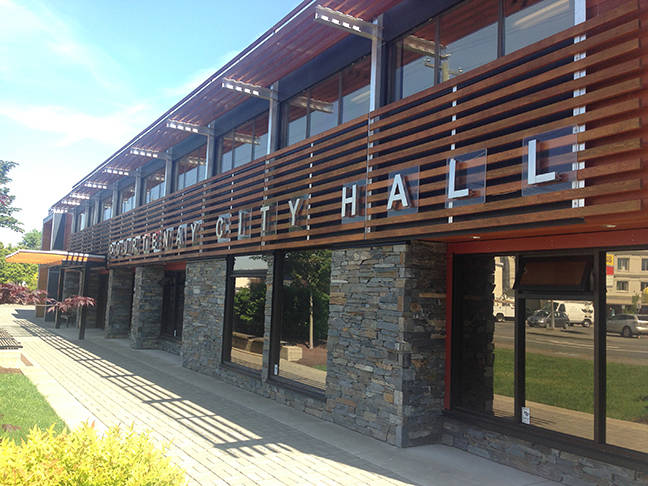
In a prepared statement released by the City of Courtenay, Mayor Bob Wells expressed his concern and disappointment with BC Housing’s decision to purchase the Super 8 Motel as an alternative housing solution for tenants of the Courtenay Travelodge.
BC Housing has been leasing the Travelodge since the spring of 2020, originally in an effort to assist the unhoused during the pandemic.
The lease with the Travelodge expires at the end of June.
According to BC Housing, efforts were made to purchase the Travelodge outright, but a deal could not be made with the owner(s), so BC Housing changed its plan, and bought the Super 8, to ensure the residents at Travelodge had accommodation beyond the June 30 end-of-lease date.
On May 30, the City of Courtenay published comments from Wells, stating he is disappointed and concerned that BC Housing and the provincial government have opted to move supportive housing residents from one motel to another, rather than create the much-needed purpose-built supportive housing and wraparound services advocated by city council.
“It’s unfortunate that the province and BC Housing were unable to purchase the Travelodge property for supportive housing as that location had more units and we have a lot of people who are still in dire need of shelter and support,” said Wells. “Buying the Super 8 and simply moving residents between motels with no added capacity or additional services really isn’t the long-term solution we’ve been pushing for. Council has been unanimous in its call for purpose-built supportive housing and the wraparound services needed to make it work. BC Housing and the provincial government know that, so while this temporary solution at the Super 8 ensures people at the Travelodge continue to have a roof over their heads, it does nothing to address the serious long-term need that isn’t going away.”
Wells said the Super 8 is not currently zoned for supportive housing – an issue BC Housing presumably would have known prior to the purchase of the motel. In his statement, Wells says the province and BC Housing have forced the issue, without following proper channels.
“City staff are now working with BC Housing on their temporary use permit for the Super 8 site which is not zoned for supportive housing, and to ensure safety and security requirements are addressed related to this use of the property,” added Wells. “We expect BC Housing to follow the rules around the temporary use permit application processes, particularly when it comes to safety, and transparent public consultation. Our citizens deserve to be heard and BC Housing needs to be prepared to engage with the community. BC Housing has a tight timeline because the lease on the Travelodge ends June 30 resulting in the need to move the current residents into the Super 8, but that shouldn’t be an excuse for not addressing legitimate community concerns.”
According to the province’s May 29 announcement, BC Housing is in the process of submitting a temporary-use permit application to the City of Courtenay so the Super 8 motel can be used to provide housing for people staying at the Travelodge Courtenay. Wells said the city had yet to see a completed application form at the time of the announcement.
Wells said Courtenay wants to be “an engaged partner with the province and BC Housing,” which starts by recognizing the important individual roles played by the city and the provincial government.
“We also recognize that as the senior level of government, the Province of British Columbia can brush aside any city process or regulations and proceed under its own authority,” explained Wells. “But good partners do not ignore one another, and that means we need to co-operate to find a workable balance that respects the community as we strive to solve the long-term supportive housing crisis that is in front of us right now.”
BC Housing has scheduled a public information meeting at the Lower Native Sons Hall Lodge Room, Thursday, June 8, from 6-8 p.m. Interested individuals can also contact communityrelations@bchousing.org and ronna-rae.leonard.mla@leg.bc.ca
Wells said that like the Province of BC, the City of Courtenay recognizes the need for a timely and practical supportive housing solution that works now and into the future. City council is demanding that BC Housing commit to the development of additional permanent supportive housing with wrap-around services to meet the urgent need of people living unsheltered right now in our community, as well as a permanent, purpose-built shelter to accommodate the relocation of Connect and its services.
“When it comes to the long-term success of supportive housing, the only real answer is purpose-built housing and the important services that go with it,” noted Wells. “Motels might be a temporary fix, but they are not the best long-term answer. I want our city to work alongside the provincial government and BC Housing, but I also want to make sure we are heard, because that level of co-operation and engagement is critical for this particular housing project and others to come.”
In his follow-up interview with the Record, Wells pointed out that while he is upset with the process in this instance, he applauds the provincial government for its ongoing efforts in addressing the homelessness crisis in the province.
“I do want to acknowledge that I have seen our provincial government do more for housing in the last five years than in decades,” he said. “They are really in a challenging situation and they are, I believe, doing the best that they think they can, and I do appreciate that. Even though we are disappointed with where things have landed here, we’re still an absolute committed partner, and this is still our number-one priority. We want to make sure people get housed as soon as possible and as appropriately as possible.”